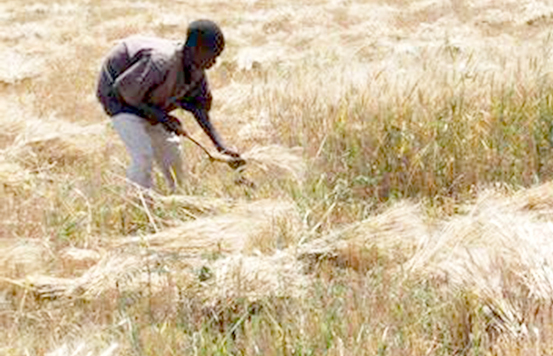Wheat irrigation: Why farmers must not wait beyond November 15 planting window
Dry season wheat production will begin in the coming days in various producing states, including Kano, Katsina, Kaduna, Bauchi, Taraba, Kebbi, Jigawa, Sokoto, Gombe, and a few others. Planting early, according to experts, has significant benefits, and farmers have been encouraged to consider the early planting window for optimal harvest, which should not extend far […]

Wheat harvest
Dry season wheat production will begin in the coming days in various producing states, including Kano, Katsina, Kaduna, Bauchi, Taraba, Kebbi, Jigawa, Sokoto, Gombe, and a few others.
Planting early, according to experts, has significant benefits, and farmers have been encouraged to consider the early planting window for optimal harvest, which should not extend far beyond November 15 if they are to harvest something worthwhile.
A former Commissioner of Agriculture in Gombe State and a farmer, Alhaji Muhammad Magaji Gettado, stated last week in Abuja that those planting weeks after November 15 may not reap anything worthwhile.
Wheat, according to Alhaji Gettado, is time-bound, and farmers should consider planting up to November 15, warning that planting late into December may not result in optimum output.
Senate wants Maiduguri airport upgraded for int’l operations
Basic healthcare provision fund to revive PHCs in Nigeria – FG
Although experts encourage farmers to plant between November 15 and December 15, those who want higher yield should plant in the first two weeks of November since wheat grows better in cold weather.
The high-yielding varieties include Atilla, Norman, Reyna 28, Ceppia and Seri 82, which are heat-tolerant and adaptable to our environment, experts have said.
Magaji Gettado, who is also the Chairman of the TIMO Agric Support Group, and the agricultural commodity associations also appealed to President Bola Ahmed Tinubu to provide timely support to farmers, adding that the culture of providing inputs late has a negative impact on farm yields.
Farmers and their unions have stated that they are willing to return to farming if the necessary support and security are provided in light of the current economic realities and security issues.
Wing Comdr. Shuaibu Hamza (Rtd), President of the Wheat Farmers, Processors and Marketers Association of Nigeria, said the association has identified approximately 77,000 hectares of land for dry-season wheat cultivation. He said approximately 40,000 hectares of the land are in Niger State and that 20,000 registered farmers are ready to commence cultivation.
“We are ready to move the wheat production in this country forward. What we need from government is the enabling environment; give farmers incentives, give farmers equipment, farm inputs and security”, he said during one of the briefings held by commodity associations in Abuja.
With only a few days until planting season, many farmers are yet to receive the needed support the government planned to extend to them for irrigation production. Over the years, government support usually comes at late hours—something farmers have always kicked against.
Two weeks ago, the Minister of Agriculture and Food Security, Sen. Abubakar Kyari, announced that the federal government would cultivate about 70,000 hectares across the wheat-producing states with an expected yield of 875,000 tons for the National Food Reserve.
He stated that 40,000 hectares would be allocated to Jigawa State, while the remaining 30,000 hectares would be shared among other wheat-producing states. Jigawa got the lion’s share because, according to him, it has demonstrated a strong commitment to wheat farming by allocating 40,000 hectares of land to it.
